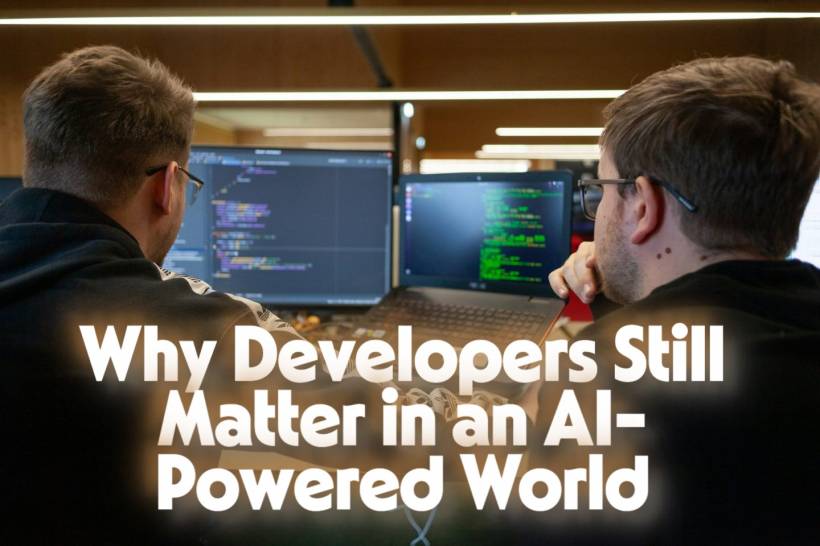As artificial intelligence rapidly becomes part of how software is built, tested, and deployed, there's a growing debate: will AI replace developers? Or just reshape their role? The short answer—developers still matter, but the way they work is evolving fast.
From GitHub Copilot's rise to reduced reliance on Stack Overflow, we're watching a real shift in how developers learn, work, and share knowledge.
The Rise of In-Context AI Tools
Today's developers no longer have to dig through endless documentation or bug their colleagues for help. AI tools now offer suggestions, explanations, and code snippets directly inside the IDE. According to Ed Keisling, Chief AI Officer at Progress Software, "Embedded, in-context tools give engineers real-time information to accelerate their development independently."
This efficiency gain means the developer role itself is shifting. It's less about writing every line from scratch—and more about solving higher-level problems.
From Coders to Thinkers: A Shift in Mindset
One of the biggest misconceptions is that AI will turn developers into nothing more than prompt writers. While it's true that prompting well is part of the modern developer toolkit, Keisling emphasizes that it's not an either-or scenario.
"We're not yet at the point where developers can just manage fleets of agent developers," he says. Especially in enterprise systems, deep understanding and technical judgment are still irreplaceable.
The core responsibility is changing—from just coding to architecting intelligent systems. Developers now have to think about structure, edge cases, and how different parts of a system interact—all before the AI starts filling in the code.
Agentic AI: Autonomy in Action
While tools like Copilot offer smart suggestions, agentic AI takes it a step further. These aren't just helpers—they're doers. They can take full instructions, break down tasks, write code, and sometimes even test and validate it.
"Calling Copilot a fancy autocomplete might be oversimplifying, but it helps highlight the difference," Keisling explains. "With agentic development, you describe the outcome—and the AI goes off and makes it happen."
Some teams are already assigning routine tickets to these agents—bug fixes, small features, documentation updates. It's not widespread yet, but the potential is massive.
The Responsibility Still Rests with Humans
As agents become more autonomous, the question of accountability looms large. What happens when an AI introduces a critical bug? Keisling is crystal clear: "The team is still accountable for any output the AI generates. It should be treated as their own."
He stresses the need for human oversight—CI/CD pipelines, testing frameworks, policy enforcement—all still apply. AI isn't a free pass; it's a tool. And like any tool, it must be managed with care.
Code Reviews Aren't Going Anywhere
Code reviews have always been a cornerstone of quality and collaboration. In an AI-driven world, they become even more critical.
"AI can still write buggy, inefficient, or even insecure code," Keisling warns. "Humans need to ensure everything connects, makes sense, and aligns with the broader product."
Automated checks can catch formatting issues or known vulnerabilities. But a thoughtful review by a human? That's what maintains integrity, security, and ethics in development.
Choosing Between Open and Closed AI Tools
With the explosion of AI tools, developers are also faced with a decision: go with closed platforms like OpenAI for convenience, or open-source models for transparency?
Keisling believes both have their merits. "Open-source tools let you see under the hood and customize as needed. But they also require more effort to scale and maintain."
Closed systems are easier to integrate and support, but may come with constraints. The choice, Keisling says, should depend on your goals, values, and how much control you need.
The Developer of Tomorrow: Less Typing, More Thinking
Looking ahead, Keisling envisions a future where developers don't just write code—they orchestrate it.
"Developers will be managing fleets of AI agents using natural language and visual interfaces," he says. "Andrej Karpathy described it as wearing an Iron Man suit—that's a great way to think about it."
This new role demands a broader skill set. Communication, ethical judgment, and product strategy will be just as vital as technical know-how.
Final Thoughts: The Heart of Development Remains Human
AI can write code. It can test code. It might even deploy it someday. But it can't yet fully grasp the nuance behind business goals, user needs, or the creative thinking required to design scalable, secure, and user-friendly systems.
So yes, the role of the developer is changing. But far from becoming obsolete, developers are becoming even more essential—as the architects, stewards, and critical thinkers behind the AI-driven future.

